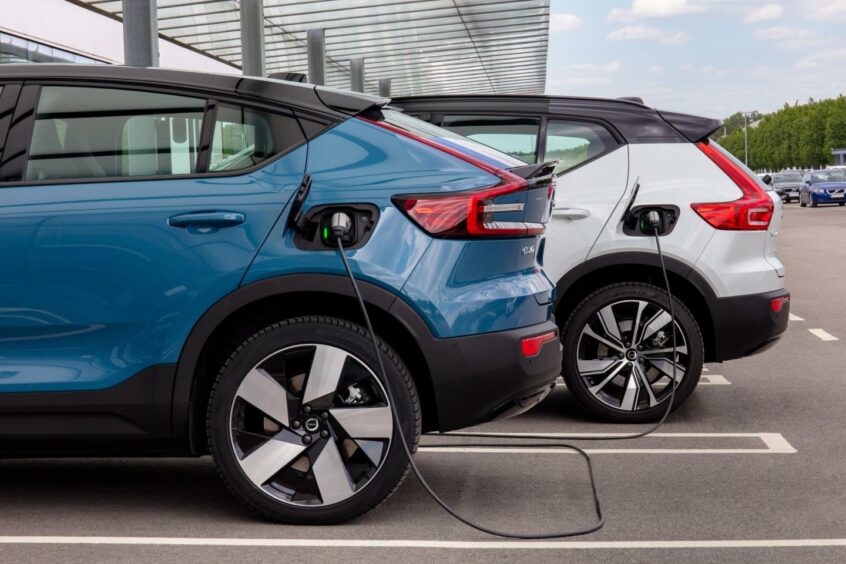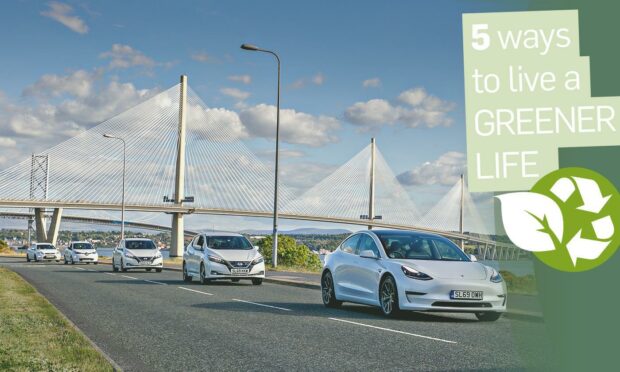The electric car has had its fair share of criticism in recent years.
Detractors claim a myriad of faults with the battery and technology, ranging from the technical, such as driving range, to the ethical in lithium mining.
But Fife-based electric car expert Euan McTurk says there is an underlying hypocrisy in much of this.
Among Euan’s work includes electrochemist with tech firm Dukosi, project engineer Warwick University and research with Oxford and St Andrews universities.
We explore five electric car “myths” with Euan and see if the claims stack up.
Claim #1: Lithium mining to create the battery is destroying the planet
Euan, who has been working on and driving electric vehicles (EV) since 2009, stresses lithium is not scarce.
“There is enough lithium in the world for over a trillion Nissan Leaf 40kw electric cars,” he said.
“So even at current rates of human population expansion, we are not going to be that stage [of running out].”
But should we be mining it at all?
Euan thinks people are making a mountain out of a molehill.
“Mining is one of the sectors that’s electrifying the quickest. If you have to go into a mine, you don’t want exhaust fumes or that can cause suffocation,” he explains.
“A lot of those processes [to make an battery] are already powered by very low carbon or renewable energy.”
He cites solar and wind-powered Tesla factories and the Gigafactory in Sweden, which “has one of the lower carbon grids in the world”.
And lithium mining is coming closer to home.
“What we’ve got in Cornwall is sea salt brines down old mines.
“Using direct lithium extraction, using a minimal amount of fresh water, it will be one of the least carbon intense lithium extraction methods in the world.”
Claim #2: Electric car battery life is poor and not suited to long journeys
Again, this is a case where ever-improving technology makes this claim obsolete.
Euan said: “The average new electric car on the market can do at least 200 miles per charge.
“There are more electric cars on the market that can do over 200 miles per charge than cars that can do under 200 miles.

“If the second-hand market is for you then there will be some vehicles with lower ranges than that, but the batteries will be holding up very well.”
Euan’s 2014 Nissan Leaf, with about around 60,000 miles on the clock, has “hardly lost its range”.
He added: “It still does its original 60-80 miles per charge, which isn’t great by today’s standards.”
Euan also has a 2015 Tesla Model S with more than 100,00 miles on the clock, which has “just recorded its best range since I’ve had it” during a trip to Wales.
He adds that now battery chemistry is “that much better and is lasting even longer”.
Claim #3: The battery cannot be recycled and ends up in landfill
According to Euan, companies are falling over themselves to acquire used batteries.
This is because they can be used for energy storage.
He said: “Even when you eventually have to replace the battery pack, you can get refurbed or new replacements.
“To be honest, the cost of the battery pack you will have already saved more than that in petrol. It’s more than paid for itself.
“And that old battery pack can then go on to be used as grid storage because it will still have lots of capacity left in it.
“An end of life electric vehicle battery has 70% of its range left, so you might not even retire the battery pack at that point.
“When you eventually replace it there’s loads of energy there for the grid storage battery, to power your house or whatever.
“Companies are already scrambling over each to get their hands on second-hand EV batteries.”
Claim #4: The charging network is confusing and overcomplicated
A common complaint is that new electric car drivers are left scratching their heads at the different options and apps needed to operate chargers.
Euan concedes there is some truth to it, but insists there are tools available to simplify the process.
He said: “The charging formats can be slightly confusing to a newbie.
“The vast majority of electric cars on the market now use CCS, the combined charging system.
“That’s basically the de facto standard in Europe.”
Euan runs the YouTube channel Plug Life Television and one of videos explains the different types of chargers and plugs.
He also says the claim of there not being enough chargers on the roads is also out of date.
“We’re adding 1,000 chargers a month in the UK — and that rate is only increasing.”
Claim #5: Electric car batteries rely on cobalt mining from Africa
Most of the world’s cobalt is mined in the Democratic Republic of the Congo — a country with a questionable human rights record.
In some cases, children are used to work in dangerous environments to extract cobalt, which is used in a number of items — including an electric car battery.
While stressing that only happens in the minority of cases, Euan agrees it is still “one child too many”.
But this is a case where EVs being placed under “far more scrutiny than other uses of cobalt” has led to improvements.
Euan said: “Electric vehicle manufacturers are paying very close attention to where the cobalt comes from and looking at the supply chain, making sure there are no kids involved.
“That said, the amount of cobalt in electric vehicle batteries is being rapidly eradicated.
“It’s been cut by about 90% between 2010 and 2020.”
Why does Euan think electric car critics are hypocrites?
Highlighting the use of cobalt and lithium in an electric car battery is one of the main sticking points with the Fife vlogger.
This is because an everyday item is also guilty of using the minerals. In fact, one is likely in your hand this very moment: a mobile phone.
Euan said: “The very smart phones and laptops people use to go on to Twitter and complain about electric cars, they’re still using the most amount of cobalt you can possibly imagine.
“There’s no sign of those companies making any changes, with one notable exception.”
He also has distain for people sowing seeds of discontent with electric cars while driving fossil fuel-powered vehicles.
“People who previously could not give a damn about CO2 emissions of their diesel Range Rover all of a sudden care a heck of a lot about the embodied carbon of a tiny little Volkswagen e-Up city car
“It’s completely insincere.”

